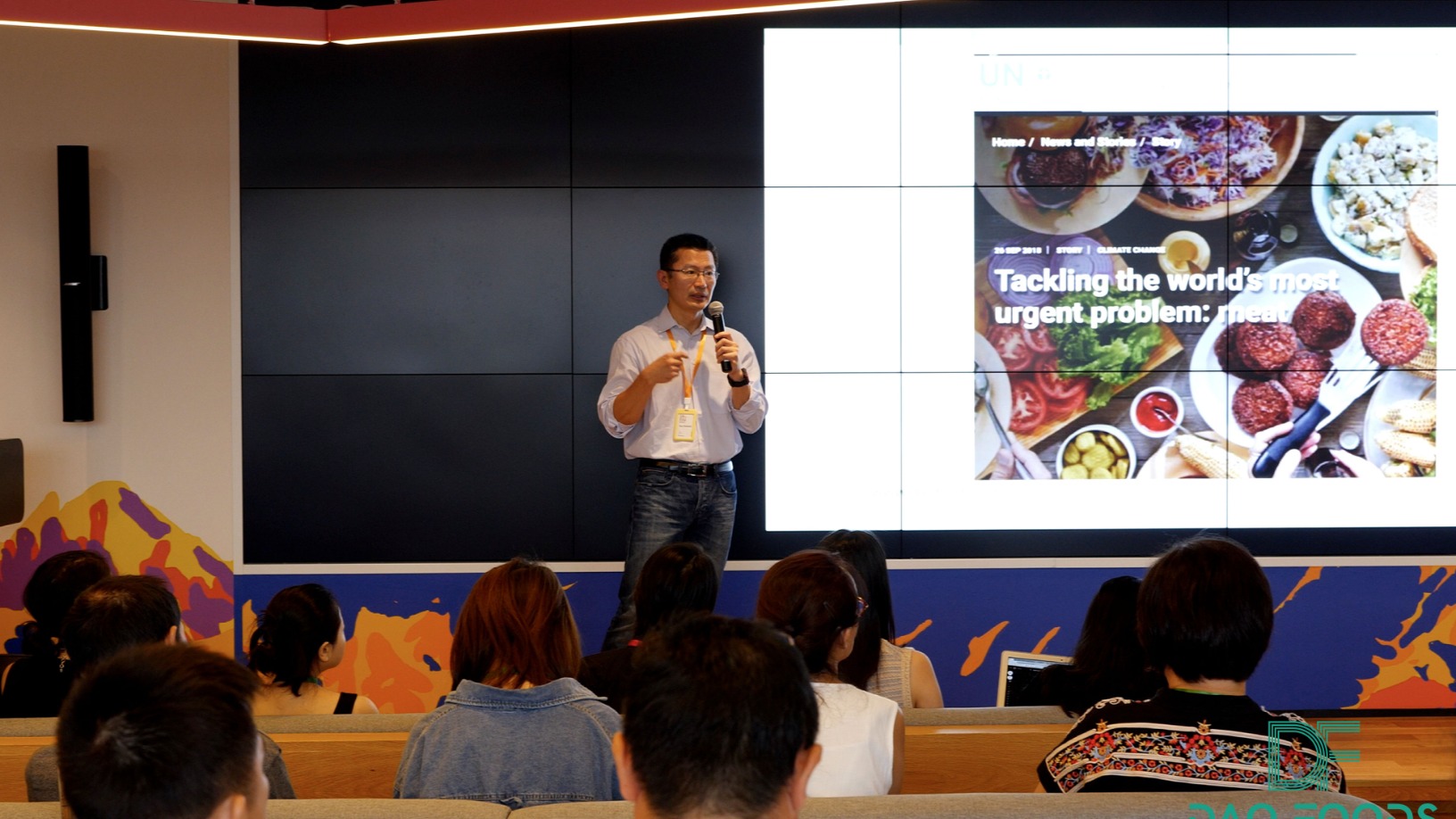Chinese plant-based startups began grabbing headlines only this year, both for securing a string of funding and for rolling out new products. Among them, Shenzhen’s plant-based meat startup Starfield is the most-funded startup so far, announcing three rounds of investments in 2020 alone; it is also the fastest growing business in China’s nascent market.
Starfield closed a nine-digit RMB Series A+ funding in October, including leading investor Lightspeed China Partners and existing investors Matrix Partners China, as well as Joy Capital and Sky9 Capital. It followed an eight-digit RMB seed funding in March and an eight-digit US dollar Series A in August.
“We might be among China’s first alternative protein ventures that has secured funding from VCs," Starfield COO and co-founder Cross Chen told CompassList via an online call.
“We had actually already raised the seed money from Matrix Partners China, Joy Capital, Dao Foods International and New Crop Capital – an early backer of Beyond Meat – several months before the news came out,” she added, attributing early investor confidence to her vegan restaurant and pop-up store “experiments” before launching Starfield in October 2019.
In contrast to most Chinese plant-based meat startups inspired by Beyond Meat’s successful IPO in May 2019, Chen and Kiki Wu, CEO and co-founder of Starfield, have run a Shenzhen vegan restaurant named Planet Green since 2017. Planet Green features Eastern and Western vegetarian fusion rather than the traditional vegan restaurant fare of tofu-made meals, and has offered new-generation plant-based food including Impossible Foods burgers (bought from neighboring Hong Kong) since the very beginning, plus Starfield’s own products currently.
Planet Green has now become one of Shenzhen’s most popular vegan restaurants on Dianding, China’s version of Yelp. “During the first two years, we found that meat-eaters accounted for 70% of our client base, with 38% of customers being return customers,“ said Chen, ”It occurred to us that the masses would like to accept plant-based products if producers could make them tasty and inexpensive.”
As plant-based protein began to gain early traction in China, Planet Green launched the Artificial Food Lab pop-up in June 2019 in Shenzhen to sell vegan snacks. This was done in collaboration with Whole Perfect, one of the earliest food companies in China to create plant-based patties. The two-month initiative was a success and long queues were a common sight at the store.
Encouraged by such positive feedback from the market, the founders soon formed a team in October that year comprising members responsible for R&D and production with the aim of diversifying Chinese consumers’ food options by creating tasty and affordable plant-based meat.
”We entered into the market about a half-year earlier than our Chinese peers,“ said Chen, who believes the early-mover advantage also differentiates Starfield from other startups emerging in China’s plant-based protein market.
Growth through partnership
Starfield is the only Chinese plant-based meat startup that has its own R&D and manufacturing capabilities. “We started by partnering with universities for product R&D, but we now do it completely by ourselves,“ said Chen, "We have a team of about 10 people for it.” According to Chen, who declined to name the collaborating universities, 40% of Starfield’s latest funding will be invested in R&D, including product iteration.
The company currently uses locally grown, non-genetically modified soybeans as the main ingredient and is also exploring other possibilities for protein sources. It has been granted an invention patent covering a method for extracting glycophilic proteins from seaweed.
Starfield’s current five production lines are jointly operated by the startup and its manufacturing partners, boasting a monthly minimum capacity of 1,500 tons. Hong Chang Bio-Tech, a subsidiary set up by Vegefarm, a Taiwanese vegetarian food manufacturer with a history of over 70 years, is one of Starfield’s production partners and has become a shareholder of the startup with a 20% stake.
In order to protect its formula and increase R&D efficiency, Starfield is currently building a factory covering thousands of square meters in Shenzhen to make plant-based mince on its own.The mince will then be sent to its partner manufactures and further processed into patties, nuggets or other formats for restaurant use.
Starfield currently rolls out its products in partnership with F&B outlets, around 3,000 in total, that usually start with special offers or limited-time sales to test consumers’ acceptance. Among Starfield’s latest clients, local fast-food chain Dicos recently announced the startup’s plant-based chicken burgers and nuggets at 2,600 outlets across the country.
“Some have made our offerings regular items on their menus,” said Chen. “Our cooperation with Chinese bubble tea chain Heytea started this March and continues.”
According to Chen, the startup has generated about RMB 10m in revenue while staying in the red. “Such noticeable achievements have helped us secure subsequent funding rounds.”
Tasty and affordable
Starfield’s plant-based chicken burger costs only RMB 20, comparable with the price of a regular one at Dicos’ stores, while the Beyond Meat burger was priced at around RMB 60 at Starbucks outlets when it was first introduced to China this April.
“Our vision is to use food tech to create tasty and healthy plant-based food that is affordable even for poorer people,” said Chen. In order to achieve that goal, Starfield has managed to lower the cost. A completely local supply chain gives it the edge in pricing, whose strategy matters. “I feel our foreign peers are making plant-based products high-end items for consumption, while we want to make our products affordable for more people from day one,” said Chen.
Chen is very confident about the company’s offerings. “Many consumers who have tasted our products at Dicos said they thought they were real meat,” said Chen. “It tastes even better than the real thing.” Starfield uses molecular sensory approaches to reveal the flavor profile of different types of meat – chicken, pork, beef and shrimp – and then substitutes the key substances with the corresponding aroma-active compounds extracted from naturally grown plants, enabling it to simulate the taste and texture of meat without adding any artificial flavoring.
She doesn’t worry about the competition at all, as China’s alternative protein market has attracted more players, including new startups, established food businesses and foreign peers. According to her, Chinese consumers have very diversified food needs. The final products offered to consumers by various plant-based manufacturers are different in one way or another, appealing to different customer segments.
More importantly, “it’s good for the market, which is still in a very nascent stage. We are all creating space for it,” said Chen. “It needs efforts from more players.” Her goal in the medium term is to produce the tastiest plant-based meat products, she said, declining to comment on business or financial targets, which for her are “business secrets.”











